
CATTLE DECAPITATION – The Monolith
Anthony Morgan
May 2012
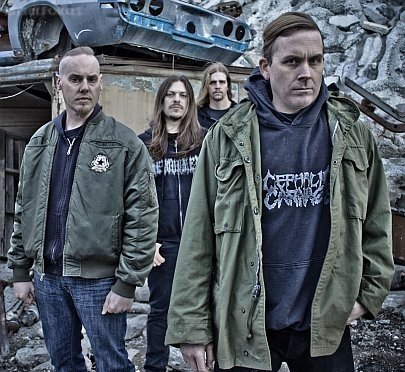
|
From late September until early November 2010, San Diego, California-based death metallers Cattle Decapitation toured across North America as part of the California Blood tour package, pairing the outfit with supports like Dallas, Texas-based death metallers Devourment. Following the conclusion of the California Blood tour package, Cattle Decapitation convened at their rehearsal space in National City, California to begin authoring compositions to form a seventh studio full-length effort. All of 2011 was dedicated towards the writing process.
“We usually get this stuff done in like fix to six months,” muses Travis Ryan, vocalist for Cattle Decapitation. “This one took awhile because we all had pretty hectic work schedules, and we all have real jobs and shit. It was kind of a pain in the ass, but the outcome was really good. We wanted to try something different this time, so we went with Dave Otero in Colorado. That was the only drag, having to leave home without pay for awhile and go to Colorado to do this. It was in the middle of winter too, and one of the colder spots of the United States. There were many days where we were snowed in, and had to stay cramped in this little apartment attached to the studio. It was kind of fun, but I realised that the only thing worse than being in a van with four dudes for a month is living in an apartment with four dudes for a month (laughs). It was kind of challenging, but the record came out so fucking close to what we wanted that everything went really well.”
The resultant album – May 2012’s Monolith Of Inhumanity – was cut from January until February at Flatline Audio in Denver, Colorado with aforementioned producer Dave Otero. Cattle Decapitation’s Denver sojourn strengthened concentration levels. “Big time,” the frontman reckons. “We were with a new guy, so we didn’t really know what to expect. We went in there extremely focused, and the same with him. He just would not stop talking about how well prepared we were compared to most bands that he deals with. I guess we were one of the most prepared bands he’s ever had in his studio (laughs), so that helped a lot. It helped expedite things a lot, and we were able to focus.
“There was fucking hardly any internet connection at the time, so we were able to just sit, listen to our mixes, and work on stuff. I actually went in there with one song worth of lyrics, and they weren’t even finished. That’s the first time I’ve ever done that. I’ve always been extremely way more prepared than that, but this time I wasn’t. I actually had one set of lyrics, and that actually ended up being one of the better songs. That first week I was able to go in there and knock it out, and everything just came out way better than we thought it would.”
Working with Dave Otero was a positive experience. “It was awesome because he’s got the best set up I’ve ever seen for bands that wanna come in, especially from out of town,” Travis enthuses. “That’s funny, because he usually only records bands from there in Denver. I don’t know how many he’s really done outside of Denver, but he’s got the perfect set up for international or bands from elsewhere in the States. His studio is attached to a house which is attached to an apartment, which all the bands stay at. We were able to stay there for the whole month – five weeks, or whatever it took – so that was a big bonus. On top of that, it’s weird that he mainly does local bands.
“This is the probably first time where we had somebody who really sat there and coached us, like a producer should. We’ve always gone in trying to be co-producers of the records, but this time we just laid it in his lap and said ‘Work your magic.’ We’ve seen what he can do for other bands. He’s done the whole Cephalic Carnage discography pretty much except for one album, I believe. They’ve always said nothing but good things about him, and have always told us about how we should go with him. The one good thing about him was his drive to record us was really high. He always would tell people ‘If only I could get my hands on these guys, I could work wonders.’ That’s the kind of mindset we want a producer to have going into it, and I think that really helped a lot as well.”

|
“He got right in there, man,” the singer continues. “He pulled the best performances out of us, and there’s times where he threw in his two cents for changing riffs or almost even rewriting parts. There’s a few things we just didn’t have a firm grasp on going in there just because, like I said, we barely had any time to write the damn thing. We had plenty of time, but with our conflicting work schedules it made it much harder. We felt we were going in there way more unprepared than he felt we were; he thought we were the most prepared band he’s ever seen, whereas we thought we were going in there a little half-cocked. The studio always turns things around though, for me at least. It always changes everything, and for the better too.
“With this record and the last record, there’d be songs where I was like ‘I’m not sure. I don’t know about this part’ or or ‘I don’t know about this line or this riff.’ Then we’d get in the studio and everything would change, and my perception of it would totally change. This one was really no different. I love hearing the finished product, but I hate recording – it bugs me. I hate tracking and I hate the boredom, but I love hearing the end result. One of my favourite parts is hearing everything together and hearing the songs as an album, the way they should be heard. This record and the last record I felt are the most put together albums, where there’s an actual flow.”
Christening Monolith Of Inhumanity was a more difficult process than naming past Cattle Decapitation efforts. “I spent the last few years wondering what the hell I was gonna do,” Travis confesses. “With the last few albums, I’ve had the title a couple of years before they even came out. I usually come up with all that stuff way in advance, and this was the first one where I didn’t really have anything. I was just kind of waiting for a spark or something to pop into my head, but there just wasn’t much coming. I was writing lyrics. I had a couple of ideas, but nothing was really sitting well and that was the thing. I actually did have ideas and they were kind of cool and stuff, but I needed that one ‘Oh shit, that’s it. That’s the one.’ It wasn’t happening for a while. What I like to do is play on themes or words or whatever that were brought up on the previous albums. On The Harvest Floor (January 2009) there was mention of a monolith, and in the song ‘The Monolith’ it’s basically a metaphor for technological advances by our species. I started to think ‘That’s a lot like 2001: A Space Odyssey (1968). What if we did something that was almost that same idea from that film, but thousands or millions of years later? Here we are, and the monolith still stands.’
“It’s a metaphor for humans’ unwavering destructive attitude and force, how destructive we are. It’s also a metaphor for our technological advancement. What you see on the cover is people devolving in front of your eyes, reverting back to apes. It was a quick way to get that idea across I felt. I gave that idea to Wes Benscoter the artist, and he really liked the idea. These concept ideas are sometimes hard to make readable on the cover, where anybody can look at it and go ‘Oh, I see what you did there.’ This one was a little more of a challenge, but I think he nailed it. I love the guy. He’s an amazing artist; it just so happens that he’s designed the artwork for all of our records, and is our guy. That’s pretty much the concept of the record.
“Songs that point to that would be the last song ‘Kingdom Of Tyrants’. There’s also a glorified intro I guess you could say that is right before that song called ‘The Monolith’. Those lyrics deal a lot with basically what’s on the cover, and definitely the opening track ‘The Carbon Stampede’. I kind of did that on purpose to where the opener, closer, and everything in between is kind of the meat of it. With every record I do this thing where there’ll be a few songs that deal with whatever’s going on on the cover. We don’t really do concept records. To me concept records have a flow, and tell a story. They’re like a book like King Diamond and maybe even Iron Maiden, but mostly King Diamond. I probably do a little more of what Iron Maiden does, which is there’ll be a song or two relating to what’s on the cover and in the layout. Then the rest of the stuff will just be random ideas – random thoughts – just thrown in there with everything else really.
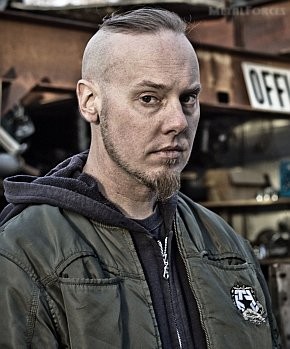
|
“There’s a couple of sequels to previous tracks from years ago on the album, for example. I always liked how Carcass would do sequels to their songs; they did a couple of those and I always liked that idea, maybe lyrically doing sequels to older tracks. The song ‘Projective Ovulation’ is a sequel to the song ‘Bukkake Tsunami’ from the album Humanure (June 2004). ‘Bukkake Tsunami’ dealt more with sperm whereas this one deals with the human ovum, the female egg. It’s in relation to over-population. Then there’s another song which we recently released called ‘A Living, Breathing Piece Of Defecating Meat’, and that is sort of a sequel to the song ‘Gestation Of Smegma’ from the EP Human Jerky (1999). That was a song about an extremely, brutally deformed life form. I wouldn’t call it human, but it’s made up of cells. Now the thing is all grown up, and needs to be an adult now. I go all over the place. There’s all sorts of stuff for people on these records. I like to mix it up.”
In discussing Monolith Of Inhumanity, the mainman stated that Cattle Decapitation has always attempted to ‘break the mould of what’s acceptable’ and ‘push those boundaries further.’ “More like what’s acceptable in extreme music, be it death metal or black metal or whatever the fuck people call it,” he clarifies. “There seems to be a formula that people have to stick to, and if they don’t they’re pigeonholed into some sort of subgenre. We just kind of want to do our own thing, and I think that for one thing doesn’t seem to be very accepted. Unfortunately it just seems to me the general public needs things spoon fed to them; they need a face put on whatever the hell is in front of them. They need an explanation, and they lack all senses of irony. They need to be spoon fed, and we’re trying to sort of break that I guess by a lot of juxtaposition of different genres.
“There are some sort of… people are calling them clean vocals, but I don’t think we even refer to them as that in the studio. It’s just melodic highs is what I call them (laughs). They’re still raspy and still screechy though, and there’s a tonality to them and melody in there. That’s actually something I’ve been wanting to do a lot more of since we recorded our fifth album Karma. Bloody. Karma (July 2006). I tried to do a little bit on there and then I started doing a lot more on The Harvest Floor, and now this one. They’ve gotten even more melodic, and have a lot more tone to them. That’s something you don’t find in this style of music at all. We were just trying to blur the lines, and push boundaries as much as possible. We like to break tradition, as long as it’s tasteful and makes sense. We don’t wanna just come out with a bunch of crap for the sake of doing something different. We really just do what we wanna hear. Hopefully people like it. If they don’t, then oh well.”
Uniting opposite extremes might be one interpretation. “We do a little of that, but to me there’s not so much of a focus on that,” Travis cautions. “The track ‘The Monolith’ is very down tempo and very non-metal (laughs), but it’s very dark and sinister at the same time. We listen to a lot of different stuff, and we like to try to integrate that with the Cattle Decapitation sound which I guess is just utter intensity. It’s always had this level of intensity to it that we try to maintain. Sometimes we’ve gone off that path, but we always pretty much come back. I think this record and The Harvest Floor is where we really found our sound.”
As the vocalist discussed, melodic highs surfaced on Karma. Bloody. Karma and have become more of a presence with each subsequent album. Whether melodic highs have reached their zenith as far as Cattle Decapitation full-lengths are concerned or will become even more of a presence on future outings is a subject for debate. “That’s actually a great question,” Travis compliments. “I was thinking about that just the other day or so. I was actually wondering if anybody was ever gonna actually ask me that (laughs). To tell you the truth I don’t have an answer, but that was something I thought about. I think about this kind of stuff as well. Am I pigeonholing myself into having to do that on every album? Is it going to be well received? That part I don’t really care about because this is the one record where I listened to the fans. Usually we don’t really, no offence to them. Opinions are like assholes. When I see good reviews of us – good meaning they’re positive reviews about our music – a lot of the time they’re just as wrong as some of the bad reviews we see. Rarely do I see anybody that’s really hitting the mark, so I don’t pay much attention to reviews or what people think.
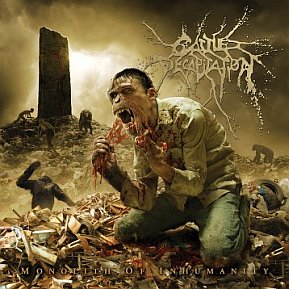
|
“We did go out on a limb on The Harvest Floor though, doing some different stuff on it. It was like ‘I wonder what people think of this.’ We listened to the fans and stuff, and there was an overwhelming response to that record – a positive one. A lot of kids were like ‘Dude, I really like these weird vocals you’re doing.’ I didn’t expect that, because I was just trying something new. I noticed that over the years I’ve added a little bit of tonality to my screechy highs or whatever, and I want to delve into that a little more. Luckily a lot of kids liked it, and were cheering me on to do more of that. That was the one thing where I actually paid attention to the fans, and what they wanted to hear. They said ‘We want to hear a lot more of that.’ I was like ‘Cool. So do I. Good. We agree on something.’ I added a bunch more. I don’t know. Just whatever I feel like doing I’ll do, and hopefully nobody will try to stop me I guess (laughs).”
Reviews are merely the opinion of one individual, and the same can be said about what constitutes ‘hitting the mark.’ “I guess it’s whether we agree with it,” the frontman chuckles, queried as to what he feels constitutes hitting the mark. “We’re the ones writing this shit, you know what I mean? The mark would be whatever we decide, because we did write the music. Sometimes I feel they hit the mark, and it’ll be something that I wish they didn’t figure out because it’s embarrassing or whatever. I’ve got no examples for you, but that’s also to me hitting the mark – if it’s how we also feel. The truth is out there; whether it’s opinion or fact, the truth is out there. When somebody calls it out I would say that is hitting the mark, like ‘He’s right there. You can’t deny that.’ The farther we come along, the bigger we get or whatever, and the more people that our records get in front of… This happens with every artist.
“Obviously when you’re in front of more eyes, you’re gonna be more critiqued. There’s just been a lot less negative critiques I feel on our last couple of records, but there’s always gonna be those Windows warriors that just can’t be satisfied with anything. That’s why taking people’s opinion into account doesn’t matter. At the end of the day, all that matters is whether you’re happy doing it and what you wanna do. If people don’t like what they hear, then fuck them (laughs). Fuck them. We’re talking about destroying humanity, so we don’t really give a shit what they think (laughs).”
Future Cattle Decapitation records could equally boast an entirely different vocal direction. “Possibly,” Travis ponders. “The thing is, it’s been an evolution. Kids have always said ‘Why don’t you sound the way you do on record when the band plays live?,’ and there might be a couple of production reasons for that. I don’t know, but one thing I can tell is it’s different from night to night and it’s different from room to room. PA systems are gonna be different every time. For one thing, my instrument – the vocals, the structure of my body – is organic. It’s always gonna be somewhat tweaked – somewhat different – and I like that. I like that quality. I don’t know why people get weirded out by it. I like it. I always liked when I went to see bands and they played a part differently, or there was a change to something. It was just fucking cool. I’m an attention deficit poster boy; unfortunately, that’s how I’m chemically wired. I like to keep things different and switch them up all the time, and that very well may happen.
“The thing is, I feel I’ve dialled it in. We’ve kind of honed our sound to where we actually have a sound now. This is the first time ever that I’ve seen people say ‘No matter how different they get, you can always tell it’s Cattle Decapitation,’ and that’s fucking awesome. To me that’s success. To me that’s hitting the mark, because that’s what we’ve actually been trying to do. One thing we’ve been trying to do is maintain our sound. We want people to know it’s us when they hear us, and I think the vocals help to do that a lot because of how different I’m willing to switch things up. One thing about these vocals or whatever is we’ve been touring for so long now is it’s an evolution, and the way it has evolved is by working in different environments. When kids ask me ‘What should I do to strengthen my voice?’ or ‘… find my sound?’ or whatever the fuck, I always tell them that. I always tell them to play in as many different situations.
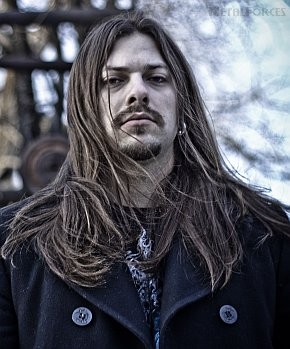
|
“It all really just comes down to experience, so over the years I’ve developed different ways of doing them – different things. That’s how a lot of these high vocals happened. I wasn’t doing this ten years ago, and that’s just how it happened. It was through a slow progression – a slow evolution – by playing in all sorts of different environments. Experience really does make a difference. I think that’s why a lot of these new, younger bands all sound the same, piggy backing off of what the last guy did and trying to make that more insane. This whole movement – whatever you wanna call it – is extremely exactly what I’m talking about. It’s like ‘We’re gonna throw in five times the amount of Meshuggah parts or whatever than the last guy.’ It’s like ‘Fuck, dude. Can’t you sing using your own ideas?’”
Such musicians are arguably attempting to impress their friends and peers. “Or something, yeah,” the singer concurs. “The YouTube generation is what I call it. It’s like ‘Look at me, look at me, look at me.’ There are a lot better players out there than there was before, but I guess I wish they would all fucking think for themselves instead of doing what everybody else is doing.”
Guitarist Josh Elmore, meanwhile, commented that the group had ‘spent a lot of time thinking about structure on this record.’ “That’s more on them,” Travis reasons. “I know that we definitely wanted some time to let the songs mature, and tried to stay a little more away from the start-stop-start-stop kind of shit. For me structure wise, I happened to have a couple of different influences. I don’t even wanna mention them. I don’t want to freak people out.”
Encouraged to supply additional information, the mainman speaks further. “I’m influenced by the cadence of some rappers and stuff like that, like Eminem and shit like that (laughs). I’m not influenced by rappers in the sense of ‘Okay, I’m gonna try this part here and see what I can do.’ I would never, ever try to fucking integrate hip hop with metal – it’s a fucking joke. I would obviously never do that. Being influenced by the way somebody puts words together is how I’m influenced by say Eminem or somebody like that. It’s solely how they put words together, and how they make things rhyme that shouldn’t. That’s an influence for me, I will admit freely. Fuck everybody that wants to put words in my mouth. ‘Oh, he likes rap.’ It’s just something different, a way of looking at something.
“We don’t wanna bastardise death metal any more than we already have (laughs). That’s kind of what everybody’s been doing since it came out. For instance, Carcass or Napalm Death were hard to categorise. It wasn’t goregrind, or death metal. I guess that was the start of deathgrind or whatever, Utopia Banished (Napalm Death, June 1992), Harmony Corruption (Napalm Death, September 1990), and the first few Carcass records. That’s the school that we come from. I don’t know about Dave… I know that Dave likes a lot of these bands (laughs). That’s the school that we come from. Our band has been searching for the happy medium between the school of old death metal and modern production. Not so much what people are playing nowadays – I don’t give a fuck what they’re playing – but their production is pretty damn impressive. As fake as it fucking may be, it’s shiny and people are attracted to it. Production wise, on this one and the last one we were trying to find that medium between the more organic sound that we’ve always had and the newer, more modern production sound.”
It was publicly announced on August 12th, 2009 that Cattle Decapitation had parted ways with bassist Troy Oftedal due to ‘musical and personal differences.’ “Nobody’s even asked about that,” Travis divulges. “We kind of came to a crossroads with Troy, and had to part ways with him. Some of it had to do with… what we said I think was musical and personal differences. It’s the same band shit. We got tired of each other, and had to change it. We had to do something, so we made the change. I don’t think we even had anybody in mind or lined up. We tried a couple of guys, but it was just like ‘How hard is it? Come on.’ Troy was unable to go into Canada, so we had a guy do Canada and Europe with us. Troy ended up falling ill in Europe, so he had to fly home and we continued the tour with another guy – our friend Rahsaan Davies. He helped us out for awhile, and then we needed somebody permanent. Rahsaan wasn’t really able to do the permanent thing, so Dave – through his travels or whatever – befriended Derek who was in a band called Unmerciful. We knew of that band.
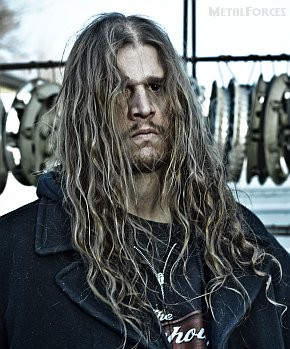
|
“We watched a video of him playing one of our songs, and he nailed it. This guy has an amazing ability to learn stuff extremely quickly. He brought a lot to the table as far as writing, which was a relief because Troy was a big part of our songwriting. It could’ve gone either way; the guy could’ve just absolutely sucked at songwriting, or not been the guy at all. That turned out to be very, very far from the truth. He ended up being a perfect guy to write the record with; he had a lot of riffs to bring to the table, and he was extremely hungry to do that. That’s what we needed. We tried out a couple of guys that were just like ‘What the fuck were you thinking coming here and wasting our time?’ (laughs). Derek (Engemann) didn’t. He flew out, and we tried him out. We did a tour together, and then when we got back from that tour he moved out here. We did another tour, and then we started writing a month or so after we got back after the holidays. The rest is gonna be history I guess.”
Structuring compositions is one of Derek’s strengths, the vocalist feels. “He’s got another band called Christ Hate where he’s the singer / songwriter and guitar player, the main guy,” he informs. “He’s no stranger to that. He’s not just the bass player or whatever; he’s actually a pretty well-rounded musician. I think helping out with songwriting was really one of his strong points. That, and he’s a big, tall dude with long hair and is pretty fun to watch when we’re playing live. He’s really a character, and brought a lot to the table. Metal Blade saw us with him, and they were like ‘Fuck yeah. Finally. Not just a bunch of short-haired dudes.’ He’s pretty much a beast.”
Pre-ordered copies of Monolith Of Inhumanity included collectors cards featuring individual members of Cattle Decapitation. The cards were designed by Tom Bunk, creator of 80s collectors cards The Garbage Pail Kids. “Basically when I was a kid, Garbage Pail Kids trading cards were really gory, gruesome,” Travis remembers. “They were fucking huge, everywhere. I still have my collection, which is fucking crazy. They consumed my life for a couple of years when I was in Catholic school, of all things (laughs). Basically our friend – who was our manager a few years ago – is probably one of the biggest collectors of these things, and one of the biggest fans. He really dorks out on them. He met Tom Bunk or something years ago, and he’s always kept in contact with him. He just asked him one day ‘Hey, would you be interested in doing this card series for a band called Cattle Decapitation?’ He told him about it, and Tom was just like ‘You know what? That sounds fun.’
“It had been awhile since he had done any Garbage Pail-oriented stuff. He has done a lot of stuff for Mad magazine over the years, and was one of the original artists for Garbage Pail Kids. It was just ‘If we can make this work, then fuck yeah. We have to do it.’ Even though it’s cartoon-y, it’s funny because I said ‘Alright, you know what? We’ve had way too much cartoon-y kind of stuff. Let’s make things a little more serious.’ What did we do? We came out with the most blatantly cartoon-y thing we’ve ever done. Again though, it’s one of those things where it’s like ‘Well, fuck. How can we pass this up?’ When we got the Humanure cover, I looked at that and it was like ‘It wasn’t what I had in mind for this cover, but how can we pass it up? It’s perfect; it makes too much sense, and it’s just too perfect. We have to do this.’ We ran with it, and now these Garbage Pail Kids cards were part of the pre-orders for our new album.
“We’re probably gonna still carry the cards for awhile. It’s just something cool to have, just a little different thing. We’re always trying to push boundaries of what’s acceptable, and having your own Garbage Pail Kids cards in this kind of music is kind of pushing it. It’s pretty stupid, but we like it. We think it’s cool. Not many people out there can say they have their own Garbage Pail Kids cards designed by one of the guys who originally did them. It’s kind of a cool thing.”
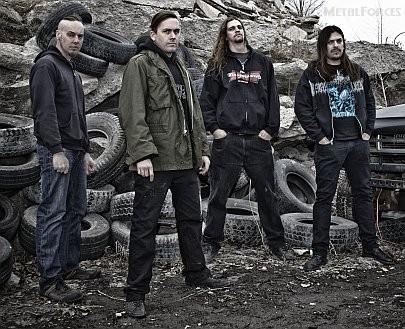
|
Albeit having attended Catholic school, the frontman is no longer a practising Catholic. “There’s not many who go through Catholic school that end up practising afterwards, there really isn’t,” he cautions. “That’s one of the dumbest moves a parent can make, sending their kids to Catholic school and thinking that that’s gonna work. The fucking percentage of kids that come out of those things that are fucked up in some sort of way, either pregnant right out of school, or drug dealers, or into drugs, or whatever… The second you hit public school, it’s on. Eight or whatever years of being held back from being able to fucking do anything… We were fucked up bastards, man. We would beat each other up out on the lawn, we would catch butterflies with these butterfly nets. We were supposed to be catching them, viewing them, and figuring out parts of the butterfly. These kids would take fucking magnifying glasses, burn their wings, and fucking rip their wings off.
“It’s one of the most stupid moves you can make as a parent, sending your kid to Catholic school. Out of all religions, the Catholic religion is just of the most off-base, fucked up things. I’m so glad to be away from that environment. Thanks to my parents putting me in that environment, I will always forever now be a staunch poster child for why not to send your kids to Catholic school. Read my lyrics, man (laughs). That’s why you don’t send your kid to goddamn Catholic school. It’s funny, because now they realise. They were just trying to do the right thing, and I understand that.
“As long as you tell a priest in a confessional and say however many ‘Hail Mary’’s, then everything’s okay though. What the fuck kind of shit is that? What the hell kind of teaching is that for a kid? Why the fuck does this pervert want to sit there and listen to this fucking shit all day? Has anybody ever asked themselves that? I have a lot of great memories and stuff, but I have horrible, horrible memories too. I haven’t set foot on those grounds since I walked off, and I’ve made myself not do that. I will not set foot on those grounds. Churches are beautiful pieces of architecture and I always loved the sound of choirs singing at midnight Mass, but I’m very, very against organised religion and particularly Christianity. Catholicism is pretty much why you see what you see when you read my lyrics. That’s the beginning of the warp that kickstarted everything.”
Monolith Of Inhumanity was released on May 7th, 2012 in Europe, on the 8th in North America, and on the 30th in Japan, all through Metal Blade Records.
Interview published in May 2012. All promotional photographs by Matthew Zinke.





